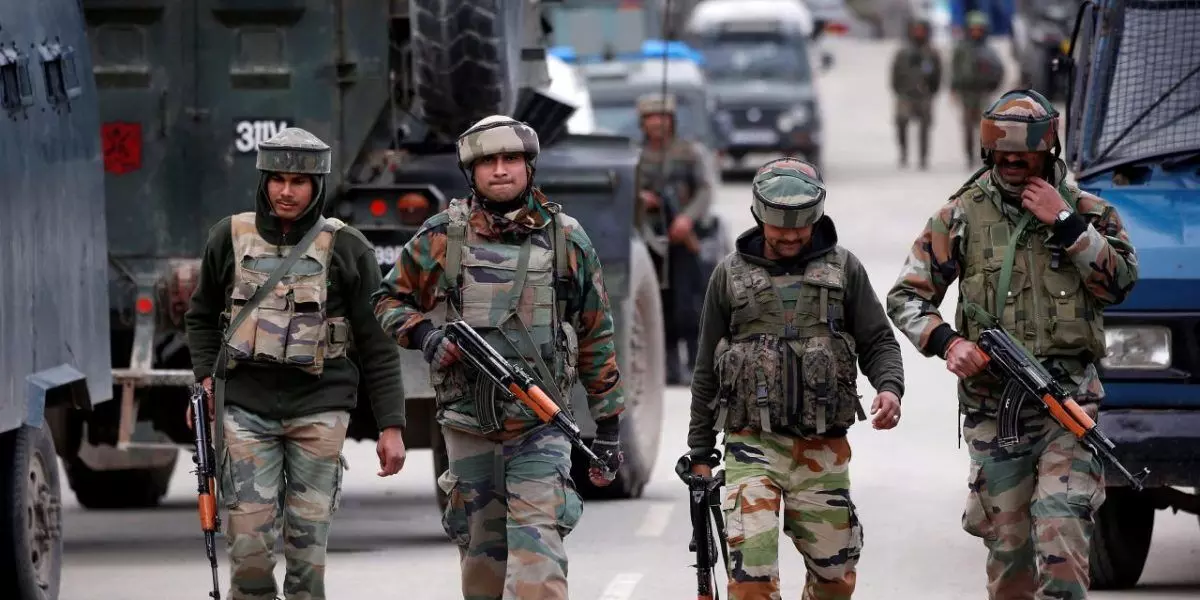AFSPA Extended in Nagaland and Arunachal Pradesh for Six Months: What is AFSPA? Background and Key Details
Union Home Ministry Reimposes AFSPA in 'Disturbed Areas' Amid Security Concerns to Combat Insurgency;

The Union Home Ministry has extended the Armed Forces Special Powers Act, 1958 (AFSPA) for the next six months after reviewing the law and order situation in eight districts of Nagaland and three districts of Arunachal Pradesh and some other areas. It is known that any area or district of the country is notified as a disturbed area under AFSPA so that the activities of the armed forces can be made smoother there.
Under AFSPA, the armed forces deployed in disturbed areas have extensive powers to search people, arrest and open fire in special circumstances if there is a need to "maintain law and order". The Union Home Ministry has said in a notification that the Central Government, using the powers conferred by Section 3 of AFSPA, had declared eight districts of Nagaland and 21 police station areas of five other districts as 'disturbed areas' for six months from April 1, 2024.
The districts of Nagaland where AFSPA has been re-imposed include Dimapur, Niuland, Chumaukedima, Mon, Kiphire, Noklak, Phek and Peren. In Nagaland, Khuzama, Kohima North, Kohima South, Jubja and Kezocha police station areas of Kohima district; Mangkolemba, Mokokchung-I, Longtho, Tuli, Longchem and Anaki 'C' police station areas of Mokokchung district, Yanglok police station areas of Longleng district have also been declared as 'disturbed areas' for six months.
Apart from this, Bhandari, Champang and Ralan police station areas in Wokha district and Ghatashi, Pughoboto, Satakha, Suruhuto, Zunheboto and Aghunato police station areas in Zunheboto district of Nagaland have also been declared 'disturbed areas' under AFSPA. In its notification issued on Wednesday night, the Union Home Ministry has said that these districts and police station areas are again declared as 'disturbed areas' under Section 3 of AFSPA for another six months from October 1, 2024.
The Union Home Ministry has said in another notification that the Central Government had declared the areas falling under Tirap, Changlang and Longding districts of Arunachal Pradesh and Namsai, Mahadevpur and Chowkham police station areas of Namsai district bordering Assam as 'disturbed areas' under AFSPA from April 1, 2024. This notification said that the law and order situation in Arunachal Pradesh has been reviewed.
The notification further states that now Tirap, Changlang and Longding districts in Arunachal Pradesh and Namsai, Mahadevpur and Chowkham police station areas of Namsai district bordering Assam are declared as 'disturbed areas' for six months from October 1, 2024, under Section 3 of AFSPA.
What is AFSPA?
AFSPA i.e. Armed Forces (Special Powers) Act gives the army, state and central police forces the power to destroy any property, search houses and shoot to death used by insurgents in areas declared "disturbed". AFSPA is used when there is a case of insurgency or rebellion and India's territorial integrity is under threat.
Security forces can "arrest" without a warrant any person who has committed or "is about to commit" a cognizable offense even based on "reasonable suspicion". It also provides legal immunity to security forces for their actions in disturbed areas. While the armed forces and the government justify its necessity to combat insurgency and insurgency, critics have pointed to cases of potential human rights violations linked to the Act.
Background of AFSPA
The AFSPA was first implemented in the Assam region to deal with the Naga insurgency. In 1951, the Naga National Council (NNC) reported that it held a "free and fair plebiscite" in which about 99 percent of Nagas voted for an 'independent sovereign Naga nation'. The first general election of 1952 was boycotted, which later escalated to a boycott of government schools and officials.
To deal with the situation, the Assam government enacted the Assam Public Order (Autonomous District) Act in the Naga Hills in 1953 and intensified police action against the insurgents. When the situation worsened, the Assam state government deployed Assam Rifles in the Naga Hills and enacted the Assam Disturbed Areas Act of 1955, providing a legal framework for paramilitary forces and state police forces to deal with the insurgency in the region. But the Assam Rifles and state police forces could not control the Naga insurgency and the rebel Naga Nationalist Council (NNC) set up a parallel government in 1956.
To deal with this threat, the Armed Forces (Assam and Manipur) Special Powers Ordinance 1958 was promulgated by President Dr. Rajendra Prasad on 22 May 1958. It was later replaced by the Armed Forces (Assam and Manipur) Special Powers Act 1958.
The Armed Forces (Assam and Manipur) Special Powers Act, 1958 empowered only the Governors of States and Administrators of Union Territories to declare areas in the respective State or Union Territory as 'disturbed'. The reason for granting such power, according to the "Objects and Reasons" included in the Bill, was that "keeping in view the duty of the Union under Article 355 of the Indian Constitution to protect every State from any internal disturbance, it was considered expedient that the Central Government should also have the power to declare areas as 'disturbed' to enable its Armed Forces to exercise special powers." It was later extended to all the northeastern states.
As announced by Home Minister Amit Shah in March 2023, the Indian government has decided to de-escalate the number of disturbed areas marked under the Armed Forces Special Powers Act (AFSPA) in Nagaland, Assam and Manipur. The move comes due to a significant improvement in the security situation in the north-eastern region of the country.

